
The politics of Indonesia take place in the framework of a presidential representative democratic republic whereby the President of Indonesia is both head of state and head of government and of a multi-party system. Executive power is exercised by the government. Legislative power is vested in both the government and the bicameral People's Consultative Assembly. The judiciary is independent of the executive and the legislature.

Indonesia held legislative elections on 5 April 2004 for both houses of the People's Consultative Assembly, the country's national legislature. This included all 550 seats in the People's Representative Council and 128 seats of the new Regional Representative Council.
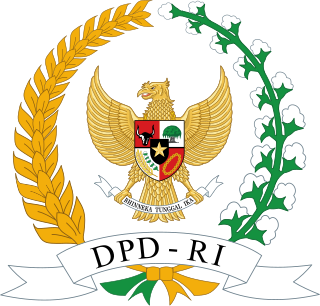
The Regional Representative Council, is one of two parliamentary chambers in Indonesia. Together with the Dewan Perwakilan Rakyat, (DPR), it makes up the Indonesian national legislative body, the Majelis Permusyawaratan Rakyat (MPR). Under Indonesia's constitution, the authority of the DPD is limited to areas related to regional governments and can only propose and give advise on bills to the DPR. Unlike the DPR, the DPD has no direct law-making power. Its members are usually called senators instead of DPD members.
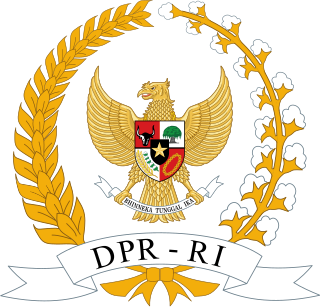
The People's Representative Councilof the Republic of Indonesia is one of two elected chambers of the People's Consultative Assembly, the national legislature of Indonesia. It is considered as the lower house, while the Regional Representative Council serve as the upper house; while the Indonesian constitution does not explicitly mention the divide, the DPR enjoys more power, privilege, and prestige compared to the DPD.

Elections in Indonesia have taken place since 1955 to elect a legislature. At a national level, Indonesian people did not elect a head of state – the president – until 2004. Since then, the president is elected for a five-year term, as are the 575-member People's Representative Council, the 136-seat Regional Representative Council, in addition to provincial and municipal legislative councils.

The Democratic Party is a centre to centre-right political party in Indonesia. It was founded on 9 September 2001. Its ideology is based on the Indonesian concept of Pancasila, and identifies as centrist.

The term Government of Indonesia can have a number of different meanings. At its widest, it can refer collectively to the three traditional branches of government – the executive branch, legislative branch and judicial branch. The term is also used colloquially to mean the executive and legislature together, as these are the branches of government responsible for day-to-day governance of the nation and lawmaking. At its narrowest, the term is used to refer to the executive branch in form of the Cabinet of Indonesia as this is the branches of government responsible for day-to-day governance.

Legislative elections were held in Indonesia on 9 April 2009 for 132 seats of the Regional Representative Council (DPD) and 560 seats of the People's Representative Council (DPR). A total of 38 parties met the requirements to be allowed to participate in the national elections, with a further six contesting in Aceh only. The Democratic Party of President Susilo Bambang Yudhoyono won the largest share of the vote, followed by the Golkar Party and the Indonesian Democratic Party – Struggle.
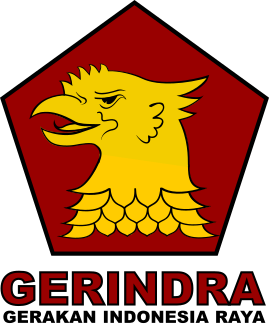
The Great Indonesia Movement Party is a political party in Indonesia. Formed in 2008, Gerindra serves as the political vehicle of former general Prabowo Subianto. It is presently the third-largest party in the House of Representatives, where it has 78 seats. Gerindra had positioned itself as an opposition party, but in 2019 it joined President Joko Widodo's Onward Indonesia Cabinet, despite Prabowo having run against Widodo in Indonesia's 2014 and 2019 presidential elections.

Harun Mohamad Kohar, more commonly referred to as Harmoko, though also colloquially referred to as Bung Harmoko, was an Indonesian politician and journalist who was active during the New Order era. He served as the Speaker of the People's Representative Council from 1997 until 1999, and was a factor in president Suharto's resignation during the widespread student demonstrations which occurred at the end of the New Order.

Muhammad Guruh Irianto Sukarnoputra is a member of Indonesia's People's Representative Council and an artist. He is the youngest son of Indonesia's first president, Sukarno with his third wife, Fatmawati, and the brother to former Indonesian president Megawati Sukarnoputri.

Legislative elections were held in Indonesia on 9 April 2014 to elect 136 members of the Regional Representative Council (DPD), 560 members of the People's Representative Council (DPR) and members of regional assemblies at the provincial and regency/municipality level. For eligible voters residing outside Indonesia, elections were held on 5 or 6 April 2014 based on the decision of the electoral commission of each different countries.
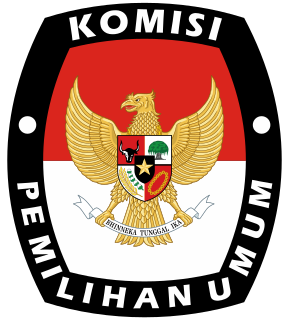
The General Elections Commission is the body that organises elections in Indonesia. Its responsibilities include deciding which parties can contest elections, organising the voting and announcing the results and seats won in the various branches of the government.

Satya Widya Yudha (SWY) is currently a Member of the National Energy Council of the Republic of Indonesia (DEN-RI) for the 2020-2025 period, after being proposed and appointed by the President of the Republic of Indonesia with the approval of the Indonesian Parliament.
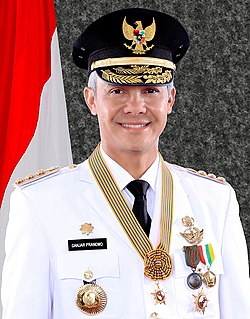
Ganjar Pranowo is an Indonesian politician who is serving as the governor of Central Java since 2013. A member of the Indonesian Democratic Party of Struggle, he previously served in the People's Representative Council from 2004 until 2013. Pranowo also served as General Chair of KAGAMA from 2014 until 2019.

Bambang Soesatyo, more colloquially referred to as Bamsoet, is an Indonesian politician and businessman, who is currently serving as the 15th Speaker of the People's Consultative Assembly since 2019, and as a Member of the People's Representative Council since 2009. A member of Golkar, he previously served as the 18th Speaker of the People's Representative Council following the resignation of Setya Novanto.

Achmad Dimyati Natakusumah is an Indonesian politician who is a member of the People's Representative Council since 2019, and previously between 2009 and 2018. Natakusumah was also the regent of Pandeglang Regency between 2000 and 2009.

The speaker of the People's Representative Council of Indonesia, commonly known as the speaker of the People's Representative Council, is the presiding officer of the People's Representative Council of Indonesia. The speaker is the political and parliamentary leader of the People's Representative Council and is simultaneously the Council's presiding officer. The speakers also perform various other administrative and procedural functions.

Mahyuddin Natimbul Same'a was an Indonesian politician and academic who served as the vice governor of South Sumatra from 2003 to 2008 and as governor of South Sumatra in 2008. Following his five-month tenure as governor, Mahyuddin later served as a member of the People's Representative Council from 2009 to 2014.













